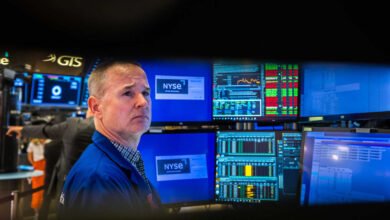I don’t care if the stock market crashes in 2024. I’m still buying bargain shares today


Image source: Getty Images
With the UK economy officially in a recession paired with political instability, there’s a new round of stock market crash predictions for 2024. A lot of bearish investors have been calling for such an event since inflation reared its ugly head. And while investors have suffered through a harsh correction, a crash has yet to materialise. In fact, stocks are actually on the rise.
Since the end of last October, both the FTSE 100 and FTSE 250 are up by double digits including dividends – a trend that seems to be continuing.
So is this the start of a stellar recovery? Or is it merely the calm before the storm? Let’s take a closer look.
The case for a market crash
Even though inflation has dropped significantly and interest rate cuts are on the horizon, there’s still plenty of uncertainty around.
Britain’s cost-of-living crisis rages on, especially in the North. Consequently, consumer spending’s been relatively weak, while credit card debt continues to escalate. And these trends are expected to continue, even more so now the UK’s in recession.
Meanwhile, the political landscape’s also shifting. As the next general election approaches, current polls suggest the Labour Party are most likely to take power. This will likely come with a drastic shift in fiscal policy. But the jury’s still out on whether such changes will benefit or hamper the economy.
A rise in corporate bankruptcies is also adding fuel to the fire, as are other factors. And combined, they all point to uncertainty – something investors are arguably allergic to.
Continued weakness within the British economy could spill over into the stock market. And should inflation make an unexpected rise, this could be the spark that sets off a new crash.
Navigating volatility
As dire as the situation sounds, it’s worth remembering a crash would be a worst-case scenario. And there’s an argument that such an event is already priced into stock valuations today.
After all, even with the recent rebound in market-caps, shares continue to be priced significantly lower than historical averages. And that’s despite a wide collection of companies that have already recovered in terms of operations and cash flow.
In other words, the rampant uncertainty within the financial markets may have just extended the window of opportunity for investors to capitalise on widespread buying opportunities.
One example from my portfolio would be Alpha Group International (LSE:ALPH). The rising fintech group continues to make waves and profit from the economic uncertainty through its currency risk management and alternative banking services. So much so that revenue and profits in 2023 reached record highs.
Despite this, the stock’s still down by around 25% since the start of 2022 and currently trades at a meagre price-to-earnings (P/E) ratio of just 12. With the firm attempting to disrupt the traditional banking sector, Alpha has plenty of competitive risks to contend with. And many of its rivals have far deeper pockets giving them the upper edge in terms of funding.
Yet, to date, Alpha has defied expectations and continues to chip away at market share. More businesses are switching to its services each quarter, benefiting from the host of new financial solutions emerging on its platform.
As such, regardless of what the economy’s doing, I’m capitalising on this bargain and buying more shares for my portfolio.
Source link





